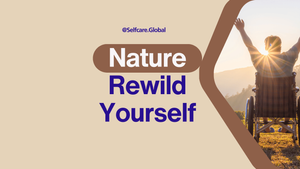The Nature-Deficit Crisis in Modern Life
Hey there, it's Rory. In our increasingly indoor world, many of us are experiencing a profound disconnection that goes far beyond missing scenic views—it's affecting our energy levels, mental clarity, and emotional resilience. That persistent fatigue, mental fog, and sense of being unfulfilled might not just be symptoms of a busy life—they could be signs of nature deficit.
When I was treating patients suffering from burnout and chronic exhaustion in clinical settings, I noticed a pattern: those who regularly connected with natural environments showed remarkably different recovery trajectories than those confined to indoor spaces. This observation eventually became a cornerstone of the SelfCare approach to rejuvenation that has transformed thousands of lives.
The 3 Major Challenges We're Here to Solve Together
- Chronic Energy Depletion: How modern indoor living disrupts our biological systems, contributing to unexplained fatigue and burnout.
- Stress Accumulation Without Release: Why artificial environments trap stress in our bodies and minds without providing natural release mechanisms.
- Disconnection and Emptiness: How separation from nature creates a subtle but profound sense of purposelessness and emotional emptiness.
These challenges aren't just personal struggles—they're collective experiences shared by many in our community. If you're feeling the weight of these issues, you're not alone. Our SelfCare community provides support and practical strategies for overcoming these shared hurdles.
The SelfCare Framework: Learn-Do-Embody-Teach
Nature connection isn't just about occasional outdoor activities—it's about a systematic approach to reclaiming your vitality:
1. LEARN: Understand Your Biological Need for Nature
Your body evolved in natural settings over millions of years. Research shows that your nervous system, immune function, and cognitive processes all operate optimally when regularly exposed to natural environments. The biophilia hypothesis explains why we experience a profound sense of belonging and reduced stress in natural settings.
2. DO: Implement Strategic Nature Interventions
Start with small, consistent nature exposures that fit into your current lifestyle. Studies show that even 20-minute "nature pills" can significantly reduce stress hormone levels. We'll explore practical implementation strategies for various life contexts, from urban environments to busy schedules.
3. EMBODY: Become a Nature-Connected Person
Move beyond "doing nature activities" to integrating natural elements throughout your life. This identity-level shift transforms your relationship with outdoor spaces from occasional recreation to essential nourishment.
4. TEACH: Share Nature's Benefits with Others
As you experience renewed energy and clarity through nature connection, you become a living example for others suffering from burnout and fatigue. Sharing your experience—without preaching—creates ripple effects that extend far beyond your personal transformation.
The Biophilia Effect: Your Hardwired Connection to Nature
The term "biophilia," coined by biologist E.O. Wilson, describes humans' innate affinity for and connection to the natural world. This isn't just a pleasant preference—it's literally wired into our biology through millions of years of evolution.
Our physiological systems developed in natural environments, which explains why:
- Your nervous system recalibrates in natural settings, shifting from sympathetic (fight-or-flight) dominance to parasympathetic (rest and digest) activation, directly addressing the physiological patterns of burnout and chronic stress.
- Your attention capacity restores through what researchers call "soft fascination"—the gentle, effortless attention engaged by natural environments that helps overcome the mental fatigue of constant directed attention.
- Your mood stabilizes through exposure to negative air ions, natural light patterns, and biodiverse sensory stimulation, countering the feelings of emptiness and purposelessness common in indoor-dominant lifestyles.
- Your energy levels normalize through synchronization with natural light-dark cycles, improving sleep quality and daytime vitality for those suffering from chronic fatigue.
A groundbreaking Stanford study found that a 90-minute walk in a natural environment decreased activity in the subgenual prefrontal cortex—a brain region associated with rumination and depression—while a walk of equal length in an urban environment showed no such benefit. This finding explains why people feeling unfulfilled or stuck in negative thought patterns often experience immediate relief in natural settings.
Want to go deeper into the science behind nature's remarkable effects on human physiology? The SelfCare Book explores these mechanisms in detail, providing a comprehensive framework for understanding and applying nature's healing potential.
From Burnout to Vitality: Nature's Prescription
If you're currently experiencing symptoms of burnout, chronic fatigue, or persistent stress, nature offers a powerful—and often overlooked—pathway to recovery:
- For burnout recovery: Japanese research on "forest bathing" (shinrin-yoku) shows that two hours in a forested environment reduces cortisol (stress hormone) levels by an average of 12.4% compared to urban environments.
- For chronic fatigue: University of Illinois research found that just 20 minutes in a park significantly boosts subjective vitality scores and reduces symptoms of fatigue—even without physical exertion.
- For mental clarity: Attention Restoration Theory studies demonstrate that natural environments provide the ideal conditions for recovering from mental fatigue and restoring cognitive function.
- For emotional emptiness: Exposure to natural awe-inducing environments has been shown to increase feelings of connectedness, purpose, and meaning, directly counteracting the emptiness often reported in disconnected modern lifestyles.
The research is clear: nature isn't just a nice addition to your self-care routine—it's an essential medicine for addressing today's most common wellbeing challenges.
Nature in the Age of Cities: Finding Your Connection
If the ideal dose is 90 minutes daily but you live in an urban environment with limited green space, what can you do? Here are evidence-backed approaches for the time-pressed or city-bound:
- Practice "micro-dosing" nature throughout your day with 5-minute tree gazing, park lunch breaks, or sunrise/sunset viewing (even brief exposures show measurable benefits for those experiencing fatigue)
- Seek "nearby nature" in urban parks, community gardens, and tree-lined streets—research shows that regular brief exposures can be more beneficial than occasional prolonged nature immersions
- Bring nature indoors with plants, natural materials, and nature imagery, which University of Michigan research shows can provide modest but meaningful benefits for stress reduction
- Prioritize quality over quantity by practicing mindful attention during nature experiences—a 15-minute fully present nature connection often provides more benefit than an hour of distracted exposure
Would you be open to experimenting with one of these approaches this week? Even small shifts in your nature connection habits can produce noticeable improvements in your energy levels, mental clarity, and emotional resilience.
Your Next Step: From Depleted to Energized Through Nature Connection
Ready to experience the transformative power of nature medicine in your life? Here's your simple first step:
The 20-Minute Nature Immersion:
- Find a natural setting (park, garden, waterfront, or even a tree-lined street)
- Leave your phone in your pocket or bag (silent mode)
- For the first 5 minutes, simply observe what you notice
- For the next 5 minutes, focus on what you hear
- For the next 5 minutes, notice what you feel (physically and emotionally)
- For the final 5 minutes, reflect on your connection to the natural world
Try this simple practice three times this week and notice the difference in how you feel. Pay particular attention to your energy levels, stress symptoms, and overall sense of vitality.
For a complete framework on using nature to overcome burnout and chronic fatigue, get your copy of the SelfCare Book. And to connect with others on this journey from depletion to vitality, join our supportive community where we share practical strategies and success stories.
Remember: nature isn't just something nice to experience occasionally—it's an essential medicine your body and mind desperately need to thrive in our modern world.
Key Research References:
- White, M.P., et al. (2019). Spending at least 120 minutes a week in nature is associated with good health and wellbeing. Scientific Reports, 9(1).
- Bratman, G.N., et al. (2015). Nature experience reduces rumination and subgenual prefrontal cortex activation. Proceedings of the National Academy of Sciences, 112(28), 8567-8572.
- Li, Q. (2018). Forest Bathing: How Trees Can Help You Find Health and Happiness. Viking.
- Kaplan, S. (1995). The restorative benefits of nature: Toward an integrative framework. Journal of Environmental Psychology, 15(3), 169-182.
REFERENCES
This is directly referenced from the Amazon best-selling SelfCare Book "Lifestyle Medicine For the People" by Rory Callaghan. If you would like to read more content like this, grab the free online chapters of the book or a hard copy.
We have done our best to reference everyone's expert opinions, peer-reviewed science, and original thoughts, all references available here and referenced in the text.
We also understand that most thoughts are not our own and there is a collective unconsciousness, unconsciousness, and universal mind stream of energy that is always at work. How our references are sorted and filtered is here.
This article is for informational purposes only and should not replace professional medical advice. Always consult with your healthcare provider before beginning any new health regimen.





